|
|
|
Sort Order |
|
|
|
Items / Page
|
|
|
|
|
|
|
| Srl | Item |
| 1 |
ID:
137727
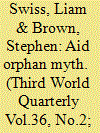

|
|
|
|
|
| Summary/Abstract |
The term ‘aid orphan’ refers to a developing country forgotten or abandoned by the development community. This metaphor has featured prominently in the development assistance policy and research literature over the past decade. Development practitioners, policy makers and researchers have defined aid orphans in manifold ways and often expressed concern over the potential fate or impact of such countries. In this paper we first examine the many definitions of aid orphans and then review the main concerns raised about them. Next we empirically examine more than 40 years of bilateral aid data to identify aid orphan countries and their common characteristics. Our findings suggest that very few countries meet the definition of aid orphan and fewer still raise the concerns collectively expressed about the orphan phenomenon. We conclude by suggesting researchers and practitioners abandon the orphan metaphor and instead focus on issues of equitable aid allocation.
|
|
|
|
|
|
|
|
|
|
|
|
|
|
|
|
| 2 |
ID:
127062
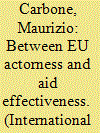

|
|
|
|
|
| Publication |
2013.
|
| Summary/Abstract |
This article argues that, by acting autonomously and cohesively, the European Union (EU) was able to shape the global agenda on foreign aid throughout the 2000s, particularly on the issue of donor complementarity and division of labour. By contrast, its ability to promote aid effectiveness in Sub-Saharan Africa was significantly constrained by national aid bureaucracies and by the complex aid architecture. More generally, to fully understand whether or not the EU is an effective actor, it is necessary to take into account how EU actorness contributes to the issue being discussed. At headquarter level, the European Commission sought to enhance EU actorness, which was seen as key to aid effectiveness. On the ground, national aid bureaucracies resisted EU actorness in the name of aid effectiveness.
|
|
|
|
|
|
|
|
|
|
|
|
|
|
|
|
| 3 |
ID:
186210
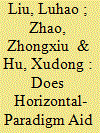

|
|
|
|
|
| Summary/Abstract |
China's aid has always been an interesting topic in the field of development economics, and the effectiveness of aid is also a controversial subject in the literature. This paper explores the relationship between China's aid and the governance of its recipient countries from 2000 to 2014. We found that, compared with the “vertical paradigm” of traditional donors, China's “horizontal paradigm” has unique features, promoting the governance of recipient countries. We employed a cross-sectional estimation and panel analysis with several regression methods. While our cross-sectional findings did not yield robust evidence to support a relationship between Chinese aid and its recipients' governance, our panel data regressions found a significant and positive relationship. The results were robust in a dynamic panel, even after correcting for endogeneity. Thus, China's aid has a positive influence on governance with the inclusion of time series. The relationship was found to vary according to aid types.
|
|
|
|
|
|
|
|
|
|
|
|
|
|
|
|
| 4 |
ID:
174985
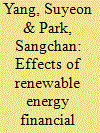

|
|
|
|
|
| Summary/Abstract |
Prior work has focused almost exclusively on the direct effect of external resources such as official development assistance (ODA) on renewable electricity generation in developing countries. We depart from this approach by suggesting that the influence of renewable energy (RE) ODA is contingent upon a developing country's internal capabilities to effectively utilize external resources. More specifically, we focus on RE financial incentive policy and political democracy to measure such capabilities and examine whether and how they moderate the relationship between RE ODA and renewable electricity generation. Analyzing panel data of 98 developing countries between 2000 and 2014, we find that the main effect of RE ODA significantly varies depending on the implementation of RE financial incentive policy and degree of political democracy. Our results add theoretical insight for studies on ODA effectiveness and generate policy implications for designing and disbursing renewable energy aid.
|
|
|
|
|
|
|
|
|
|
|
|
|
|
|
|
| 5 |
ID:
163076
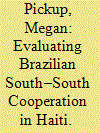

|
|
|
|
|
| Summary/Abstract |
I focus on evaluating Brazilian development and humanitarian cooperation in Haiti to answer how emerging providers such as Brazil are contributing to global development through cooperation. The paper establishes criteria for evaluation, arguing that global standards for aid effectiveness need to be expanded. I argue that when assessed on ownership, efficiency and sustainability, cooperation holds several advantages and limits, such as misplaced assumptions that Brazil’s approach is appropriate elsewhere. The discussion is rooted in the context of Haiti in order to underline how outcomes are not pre-determined, but rather depend on the model’s interaction with the partner context.
|
|
|
|
|
|
|
|
|
|
|
|
|
|
|
|
| 6 |
ID:
157712
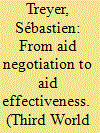

|
|
|
|
|
| Summary/Abstract |
This paper looks at aid ownership through the lens of negotiations that take place between a country and its development partners (DPs). Based on the case of Ethiopian food security policies, it combines a structural analysis of the negotiation capital of both parties with an actor-oriented analysis of the institutional setting through which negotiations take place. First, it shows that the growing influence donors have come to have in the shaping of Ethiopian public policies results from the relative loss of legitimacy the government has experienced after the 2005 political crisis and its greater need for external economic assistance. Second, the more recent creation of a negotiation platform between the Government of Ethiopia (GoE) and its DPs has allowed the GoE to enhance donor’s alignment with its development policies and regain some control over its development agenda, while giving them more room to contribute to several food and nutrition security policy reforms which have been positively evaluated. The paper stresses the need for donors to better recognise the centrality of politics in any aid intervention.
|
|
|
|
|
|
|
|
|
|
|
|
|
|
|
|
| 7 |
ID:
173905
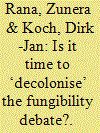

|
|
|
|
|
| Summary/Abstract |
Recent literature has established that development assistance is often fungible and that this is undesirable. In line with current efforts to ‘decolonise development studies’, we critically reflect on the underlying assumptions of this line of thinking. We establish a framework that differentiates between potential positive and negative fungibility. We hypothesise that recipient governments can redirect their own funds and achieve positive fungibility, if (1) the marginal value added in the alternative target sector/region is higher; (2) equity concerns are adequately addressed when other sectors/regions are supported; and (3) temporal delay helps to cushion instability of aid flows. There are indications that this positive fungibility might be quite prevalent. Future fungibility research should therefore no longer assume that fungibility is in itself undesirable.
|
|
|
|
|
|
|
|
|
|
|
|
|
|
|
|
| 8 |
ID:
169452
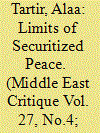

|
|
|
|
|
| Summary/Abstract |
Since the Oslo Accords came into force in 1993, the European Union (EU) and its individual member-states have invested billions of Euros, with a view to establishing the basis for an independent and sovereign Palestinian state. As Israel’s colonization of the Palestinian West Bank has progressed, Palestinian statehood has become little more than a myth. As the state-building process has atrophied, securitization has found a renewed impetus, being elevated at the expense of initiatives that seek to promote democratization. This article argues that, far from being a neutral process grounded within the building of capacities, Security Sector Reform (SSR) has strengthened the foundations of Palestinian authoritarianism. In focusing upon the development of the EU’s police mission in the West Bank (EUPOL COPPS), this article argues that EU-sponsored ‘reform’ has contributed directly to the ‘professionalization’ of Palestinian authoritarianism. The article therefore suggests that the EU consistently has failed to acknowledge the political implications that extend from its technical mandate and interventions. The EU has become, to the extent that its interventions extend Israel’s colonial project, part of the problem. In concluding, the article offers an assessment of the decade-long EUPOL COPPS (The European Union Police Mission for the Palestinian Territories) commitment, with a view to developing key lessons and recommendations that can inform future EU interventions.
|
|
|
|
|
|
|
|
|
|
|
|
|
|
|
|
| 9 |
ID:
134394
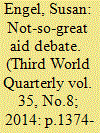

|
|
|
|
|
| Summary/Abstract |
The ‘Great Foreign Aid Debate’ raged in the 2000s yet there are few overviews of it. This paper builds on heuristic classifications of the debate not to simply classify it, but rather to explore how it is perhaps not as ‘great’ as claimed and, in fact, is contributing to a narrowing of thinking about development possibilities. The paper explores the debate through the books released in the 10 years from 2001 that made both an academic and a media impact. It analyses what gets discussed and why and, equally importantly, what does not get discussed. In terms of what is missing, the paper posits that ‘left’ has disappeared and the progressive critique and support for aid has been left to scholars like Jeffrey Sachs and Jonathan Glennie.
|
|
|
|
|
|
|
|
|
|
|
|
|
|
|
|
| 10 |
ID:
140327
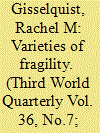

|
|
|
|
|
| Summary/Abstract |
Aid to fragile states is a major topic for international development. This article explores how unpacking fragility and studying its dimensions and forms can help to develop policy-relevant understandings of how states become more resilient and the role of aid therein. It highlights the particular challenges for donors in dealing with chronically fragile states and those with weak legitimacy, as well as how unpacking fragility can provide traction on how to take ‘local context’ into account. It draws in particular on the contributions to this special issue to provide examples from new analysis of particular fragile state transitions and cross-national perspectives.
|
|
|
|
|
|
|
|
|
|
|
|
|
|
|
|
| 11 |
ID:
121427
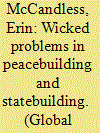

|
|
|
|
|
| Publication |
2013.
|
| Summary/Abstract |
Peacebuilding and its relatively new partner in international policy discourse and practice-statebuilding-are moving in increasingly larger circles with the recognition that business cannot be done as usual in fragile and conflict-affected states where 1.5 billion of the world's population resides. With rising prominence comes ever greater scrutiny about their nature and means for their practical realization. This article reflects on a question central to this scrutinizing that has befuddled scholars, practitioners, and policymakers alike over the past decade-how should progress out of fragility and conflict, or toward peacebuilding and statebuilding, be measured? Investigating a related question-are we making progress on this profoundly challenging task?-the article considers how international actors are endeavoring to make right on their promise to put national actors at the helm of these projects, which is increasingly assumed to be the primary driver for success in both. Examining these questions in light of scholarship, practice, and a topical policy dialogue case-the International Dialogue on Peacebuilding and Statebuilding-the article argues that, while the process and emerging outputs are messy and challenge established norms of what constitutes good assessment, they are manifesting profound changes in policy and practice, with potentially radical implications for the ways that peacebuilding and statebuilding are measured and aid decisions are undertaken.
|
|
|
|
|
|
|
|
|
|
|
|
|
|
|
|
|
|
|
|
|